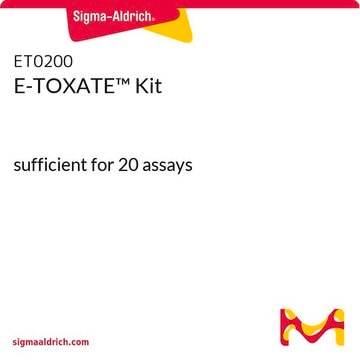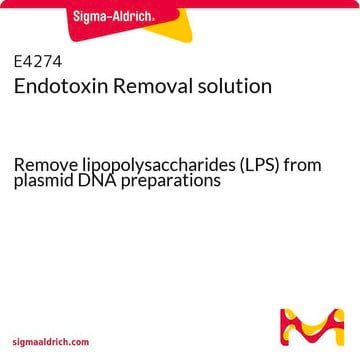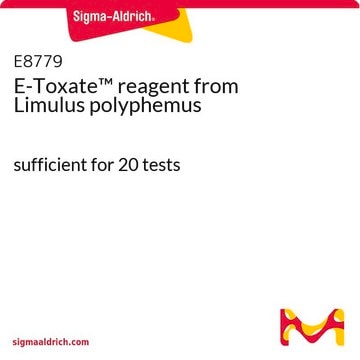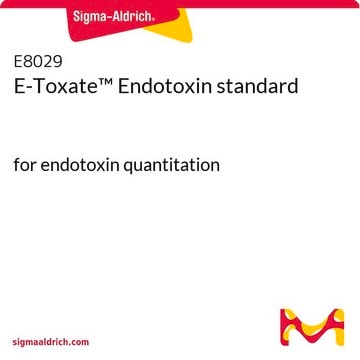E9029
E-Toxa-Clean® Concentrate
alkaline detergent
Sinónimos:
Endotoxin removal agent
Iniciar sesiónpara Ver la Fijación de precios por contrato y de la organización
About This Item
UNSPSC Code:
12352202
NACRES:
NA.26
Productos recomendados
Categorías relacionadas
Application
E-Toxa-Clean® Concentrate has been used to destroy all the endotoxins in the glasswares. It is also been used to destroy the contamination of low density lipoprotein (LDL)(+) and LDL(−) with lipopolysaccharide (LPS).
Use at 1% in hot tap water.
Biochem/physiol Actions
Alkaline detergent for pre-cleaning glassware prior to inactivation of endotoxin by steam sterilization or baking.
Legal Information
E-Toxa-Clean is a registered trademark of Merck KGaA, Darmstadt, Germany
related product
Referencia del producto
Descripción
Precios
signalword
Danger
hcodes
Hazard Classifications
Acute Tox. 4 Oral - Eye Dam. 1 - Skin Irrit. 2
Storage Class
11 - Combustible Solids
wgk_germany
WGK 2
flash_point_f
Not applicable
flash_point_c
Not applicable
ppe
dust mask type N95 (US), Eyeshields, Faceshields, Gloves
Certificados de análisis (COA)
Busque Certificados de análisis (COA) introduciendo el número de lote del producto. Los números de lote se encuentran en la etiqueta del producto después de las palabras «Lot» o «Batch»
¿Ya tiene este producto?
Encuentre la documentación para los productos que ha comprado recientemente en la Biblioteca de documentos.
Electronegative LDL induces priming and inflammasome activation leading to IL-1 beta release in human monocytes and macrophages.
Estruch M, et al.
Biochimica et Biophysica Acta - Molecular and Cell Biology of Lipids, 1851(11), 1442-1449 (2015)
A rapid protocol for construction and production of high-capacity adenoviral vectors.
Jager L, et al.
Nature Protocols, 4(4), 547-547 (2009)
Lorenz Jager et al.
Nature protocols, 4(4), 547-564 (2009-04-18)
High-capacity adenoviral vectors (HC-AdVs) lacking all viral coding sequences were shown to result in long-term transgene expression and phenotypic correction in small and large animal models. It has been established that HC-AdVs show significantly reduced toxicity profiles compared with early-generation
Nuestro equipo de científicos tiene experiencia en todas las áreas de investigación: Ciencias de la vida, Ciencia de los materiales, Síntesis química, Cromatografía, Analítica y muchas otras.
Póngase en contacto con el Servicio técnico










